Charles E W Bean, Diaries, AWM38 3DRL 606/247/1 - 1917 - 1933 - Part 9
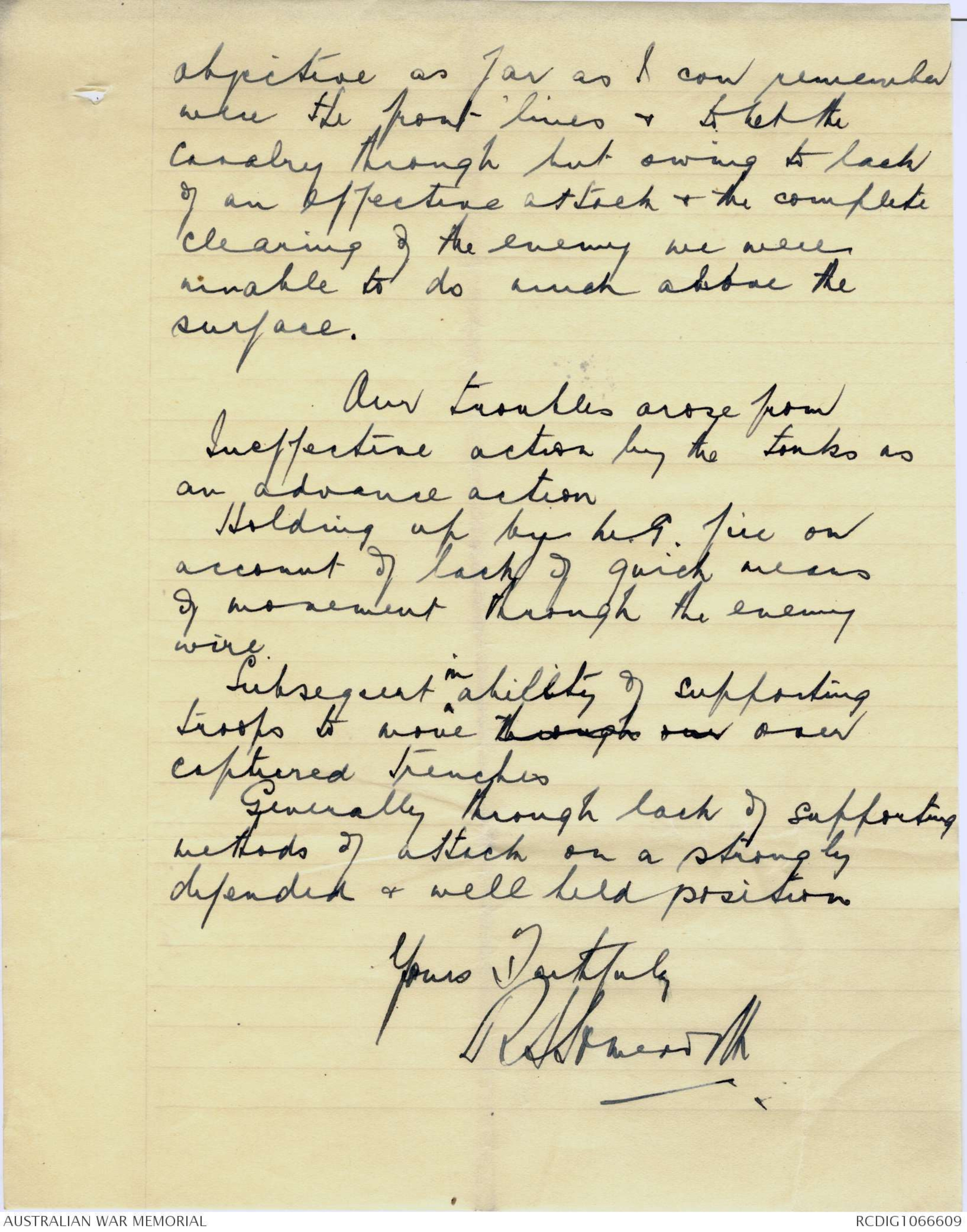
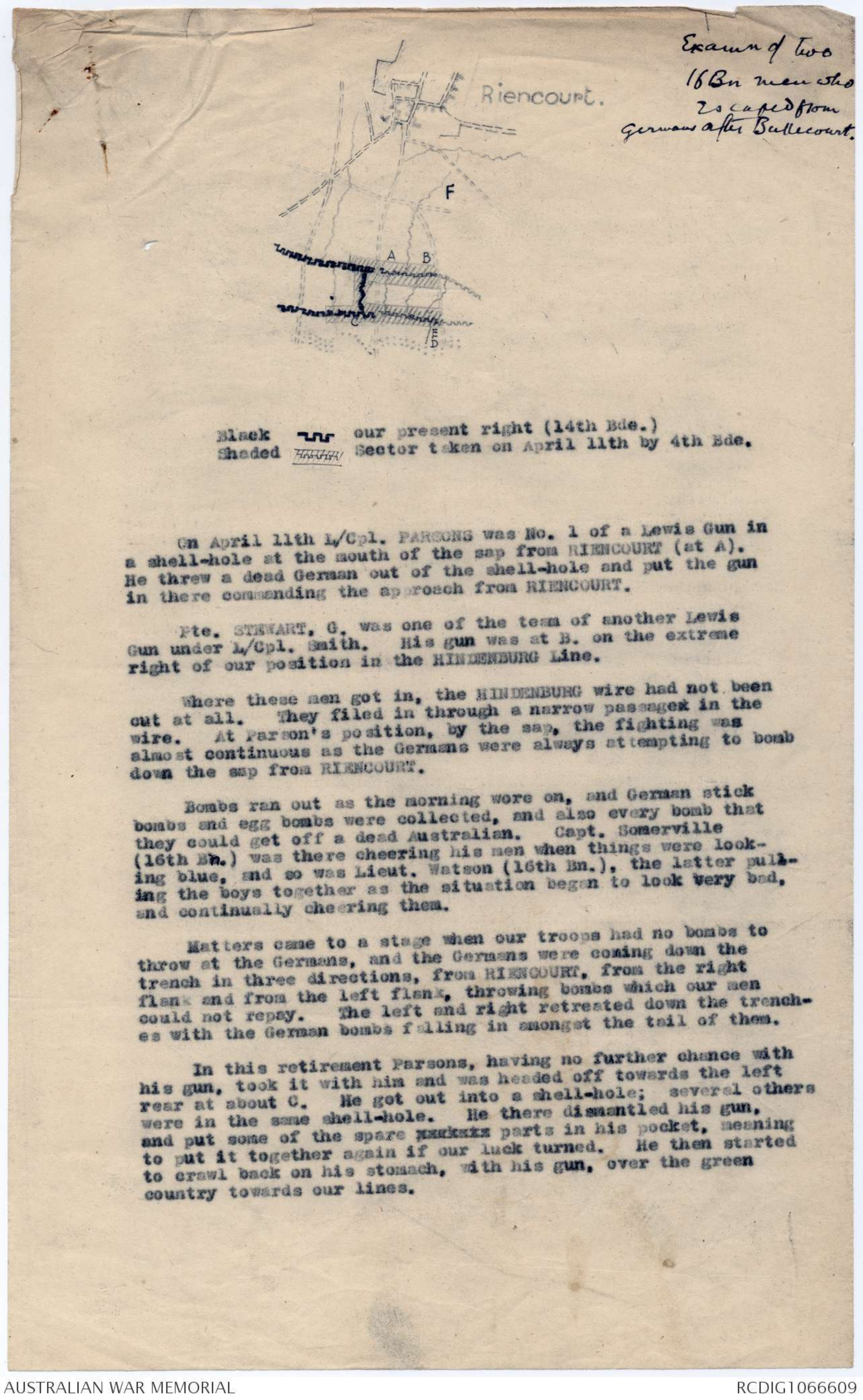
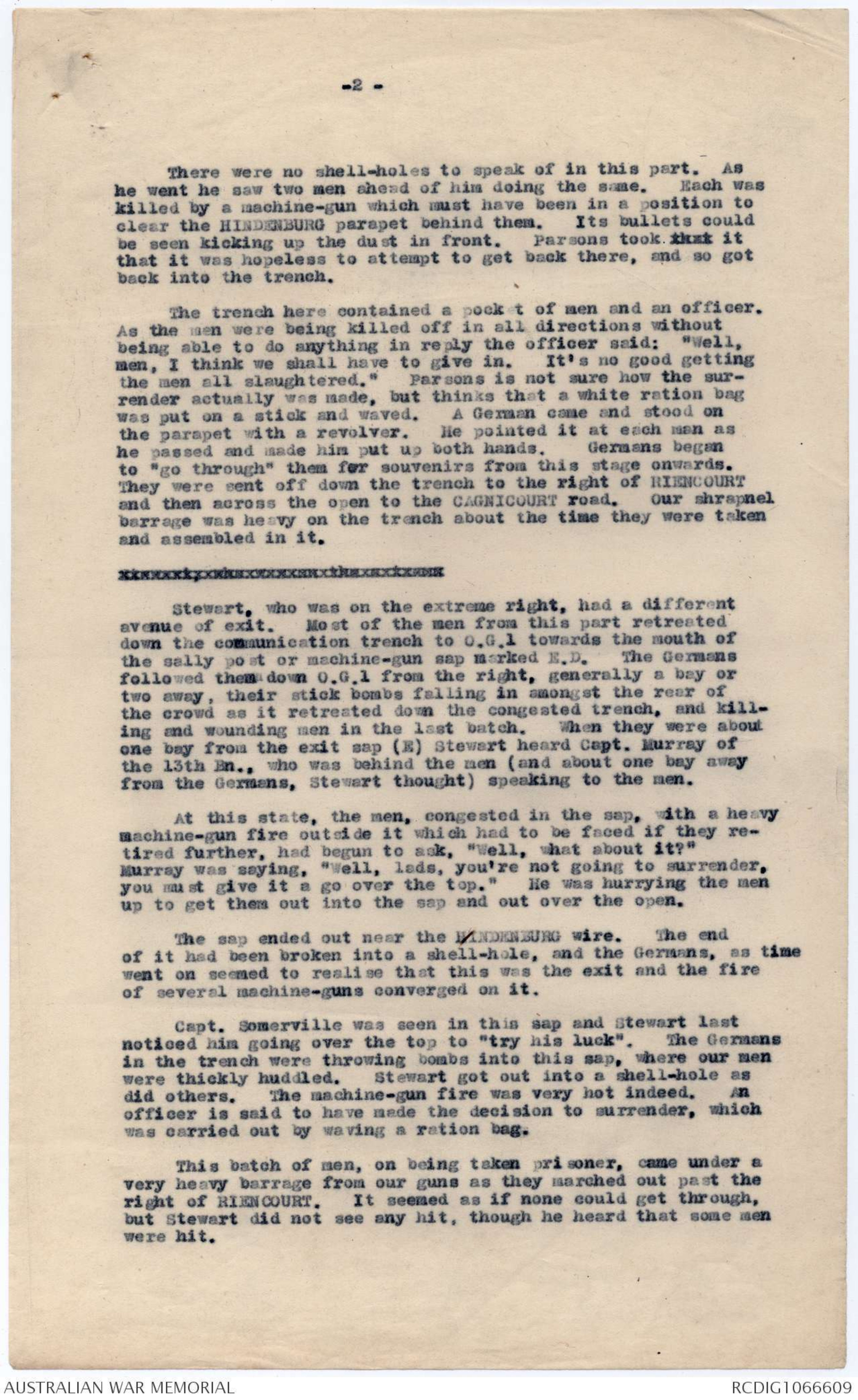
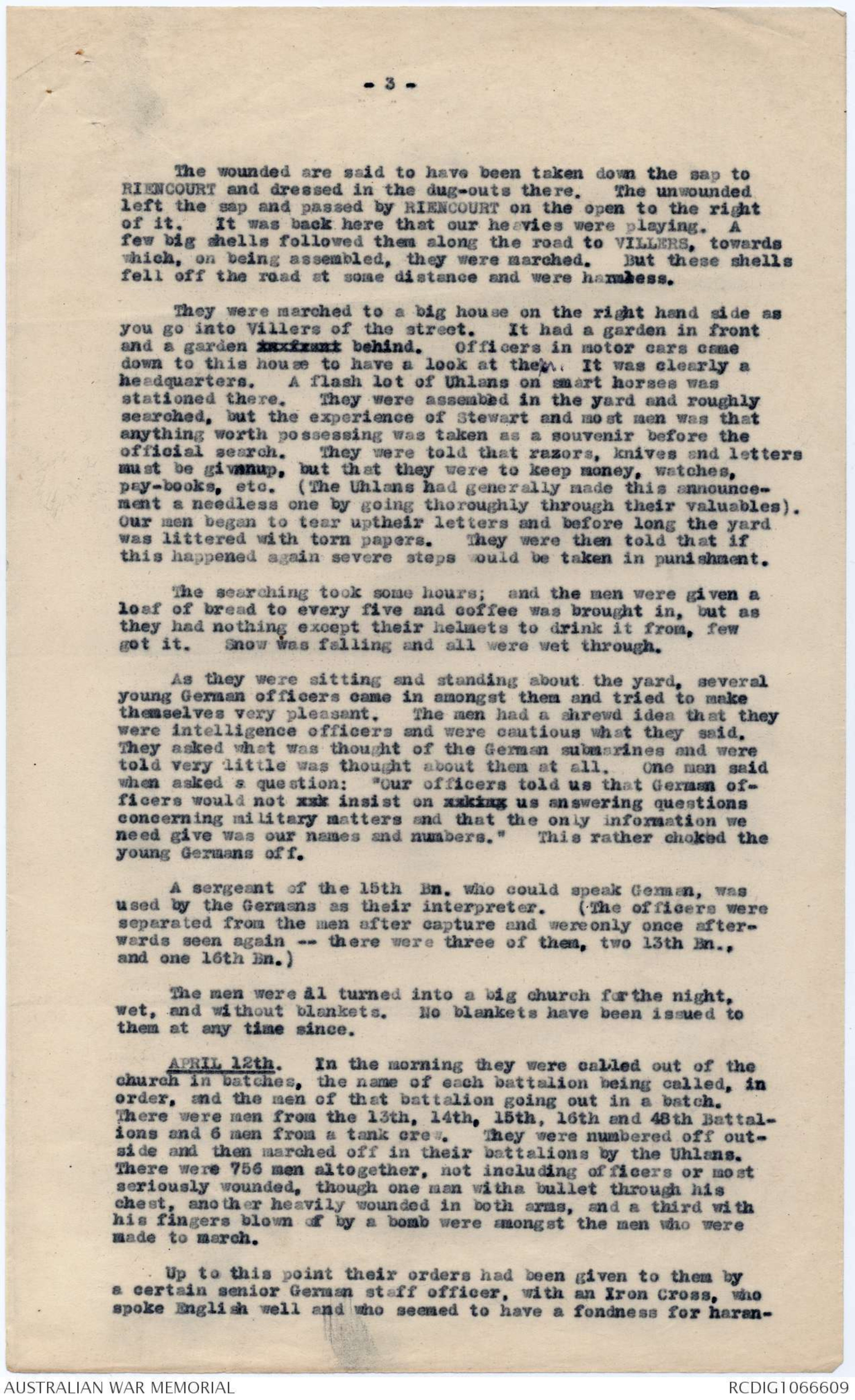
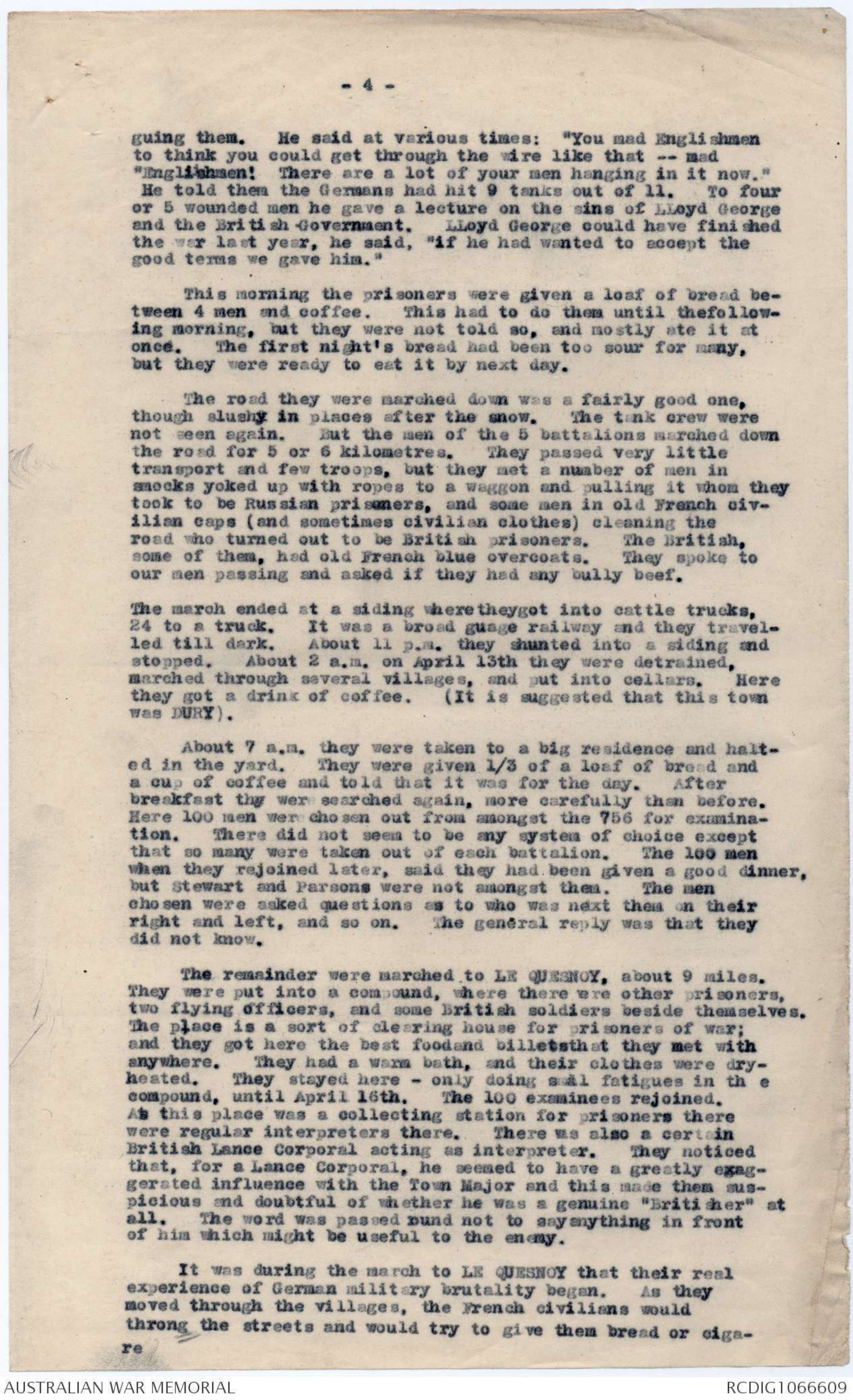
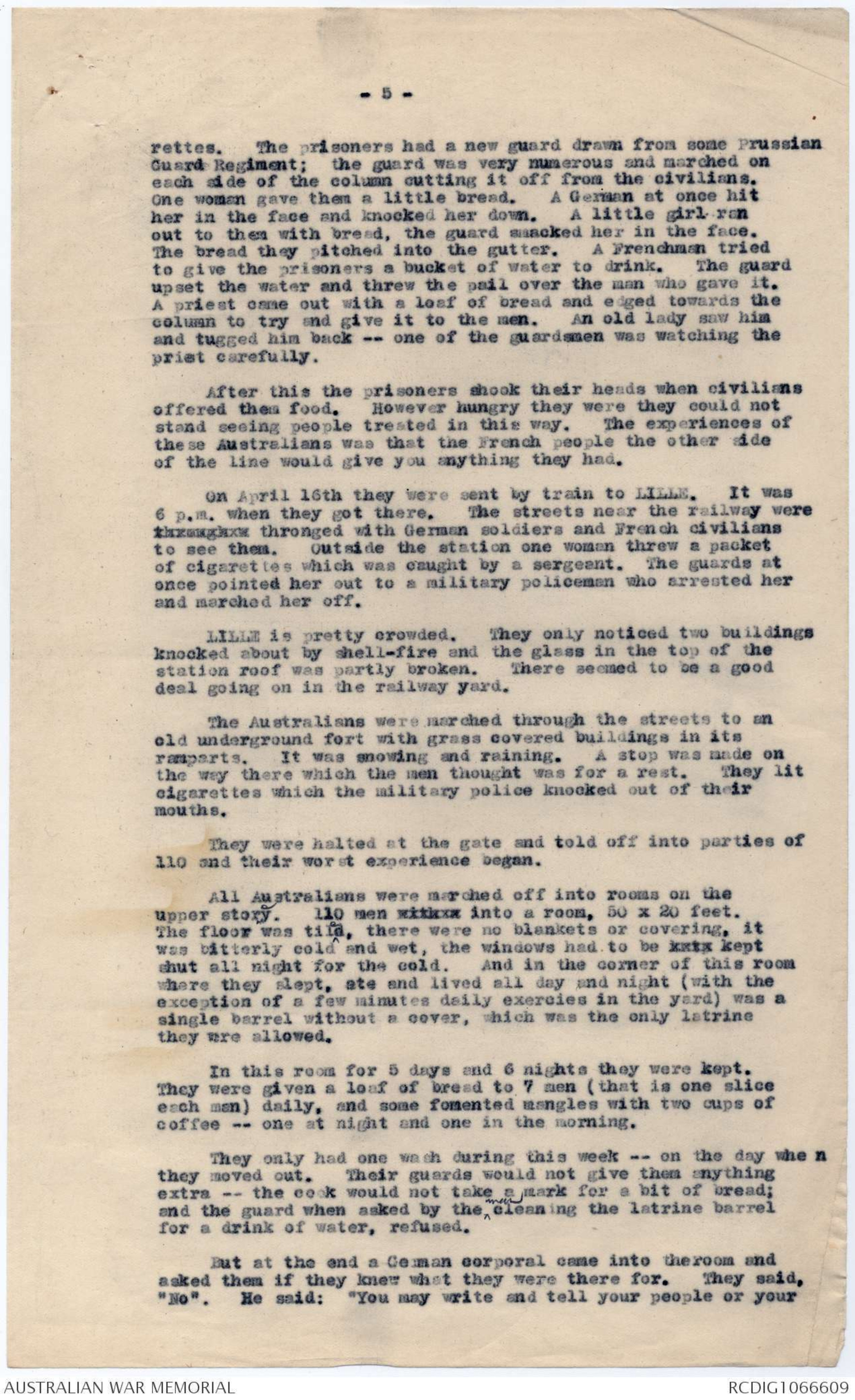
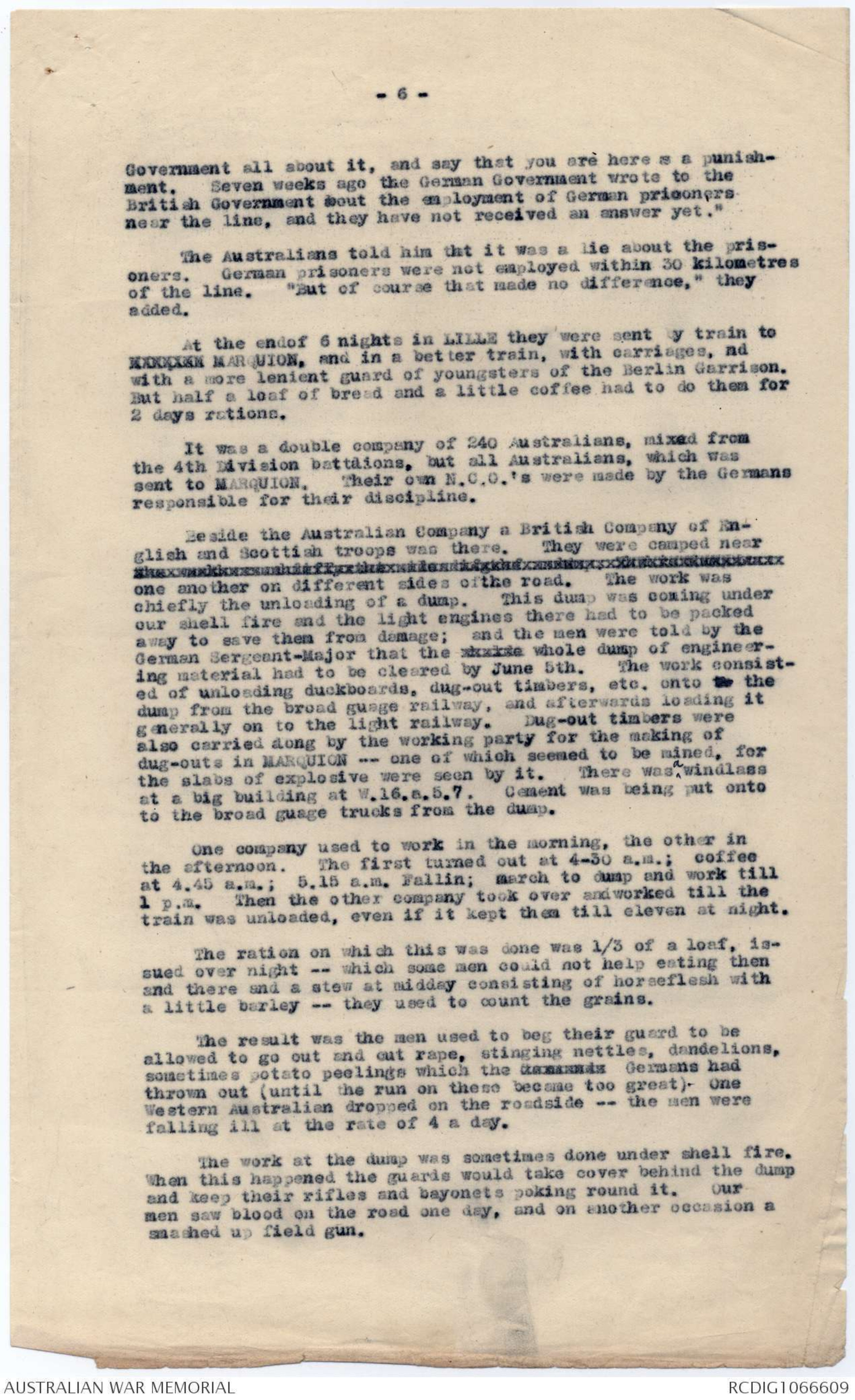
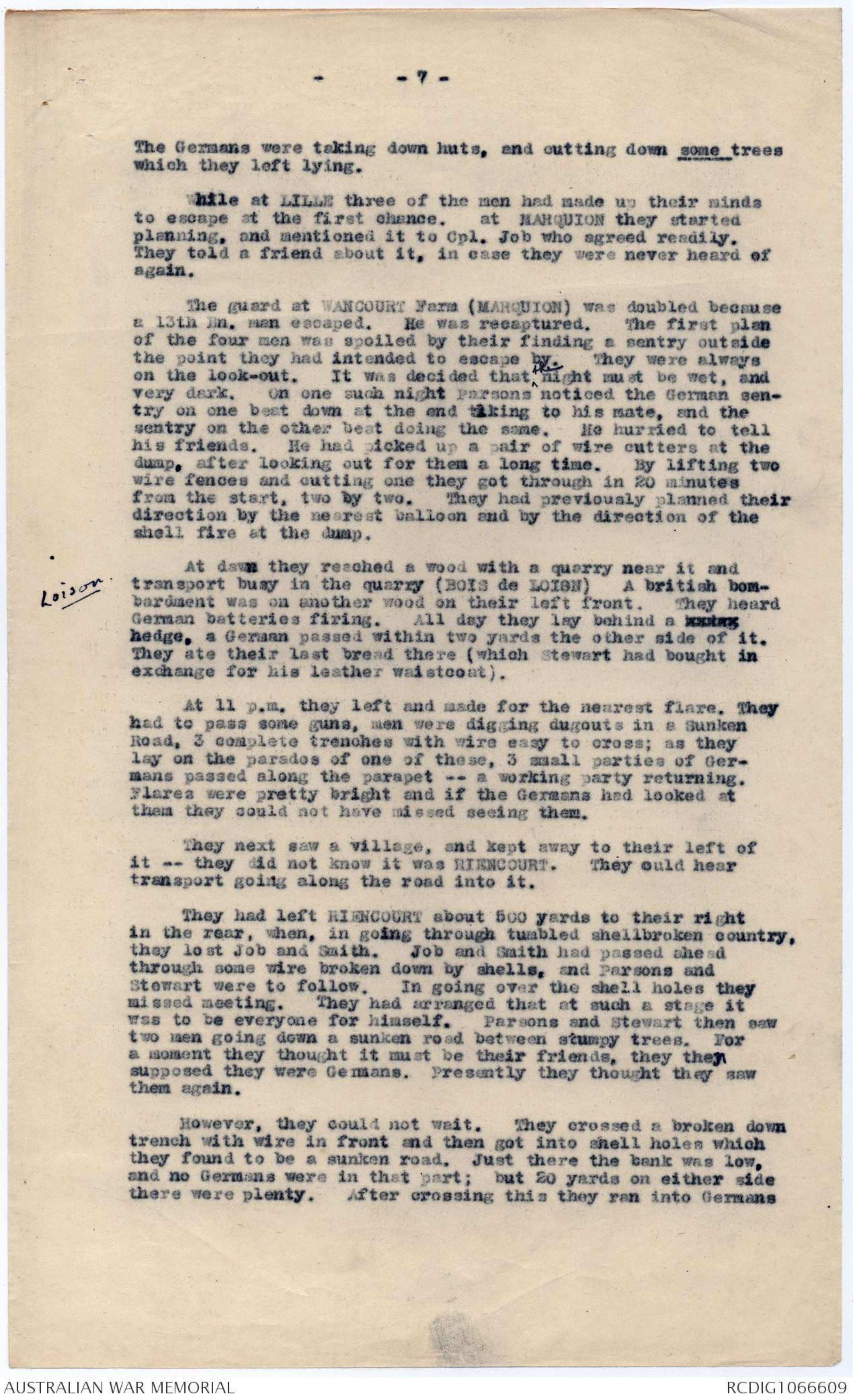
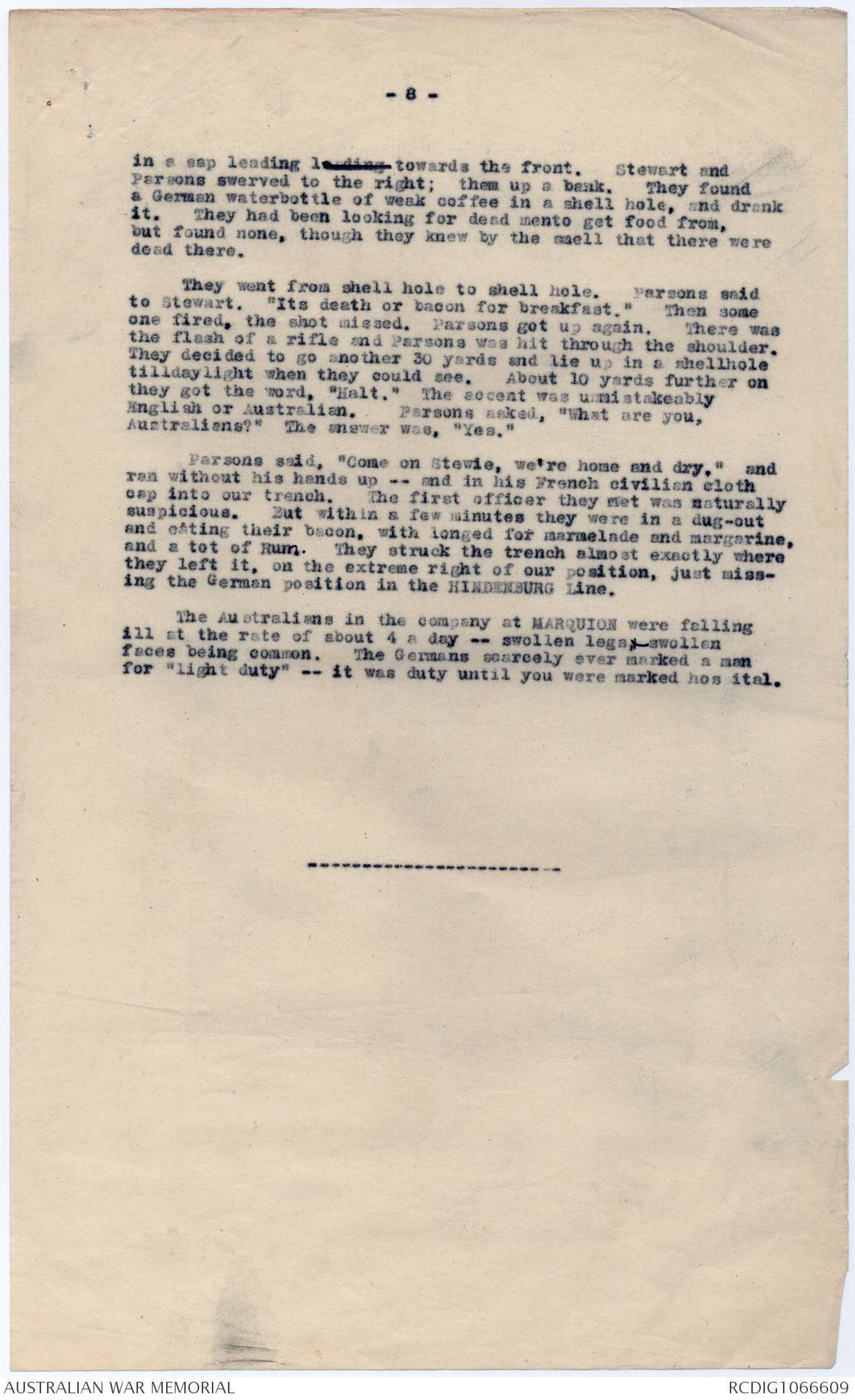
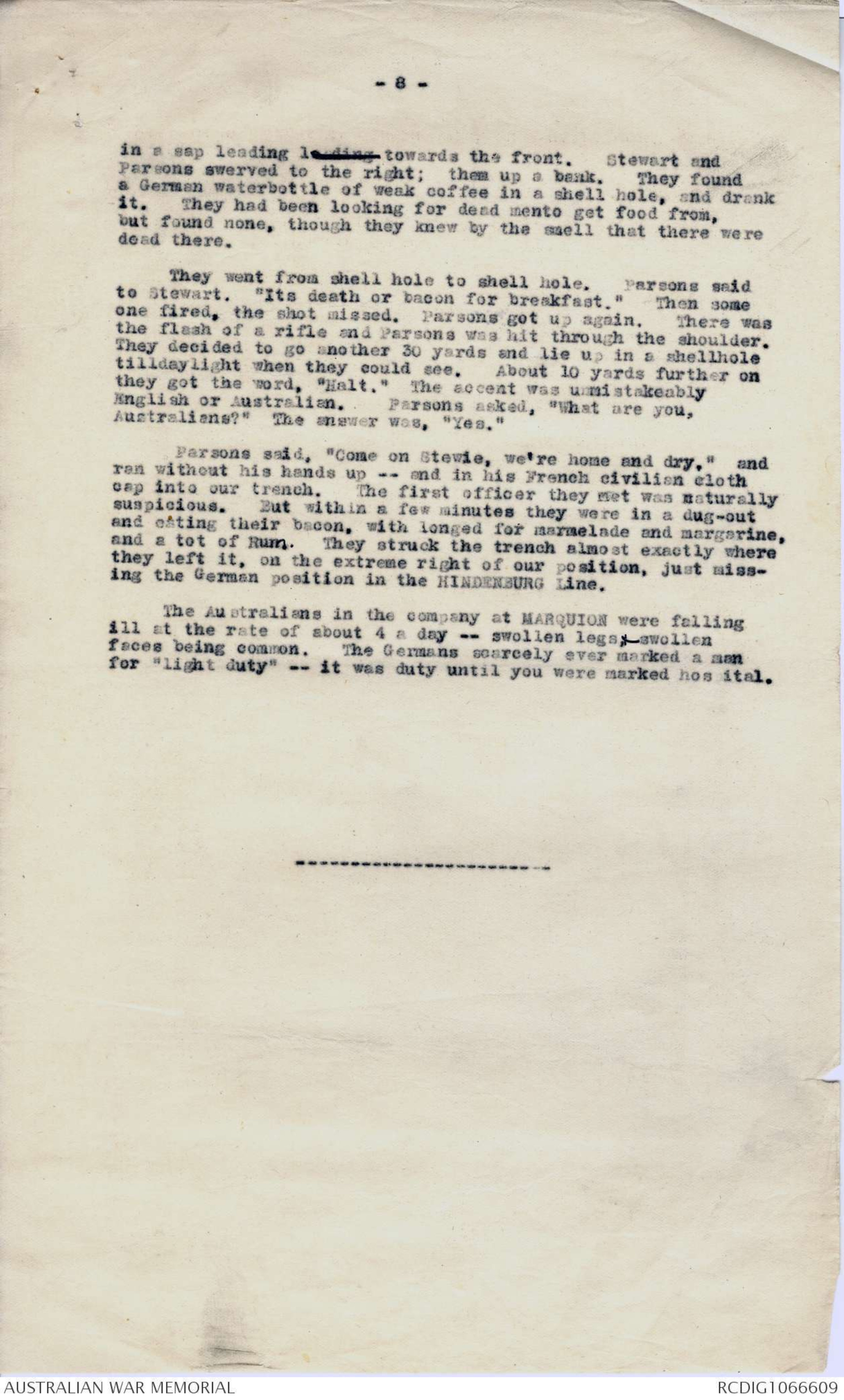
objective as far as I can remember
were the front lines & to let the
cavalry through but owing to lack
of an effective attack & the complete
clearing of the enemy we were
unable to do much above the
surface.
Our troubles arose from
ineffective action by the tanks as
an advance action
Holding up by M.G fire on
account of lack of quick means
of movement through the enemy
wire.
Subsequent ^ in ability of supporting
troops to move through our over
captured trenches.
Generally through lack of supporting
methods of attack on a strongly
defended & well held position
Yours Faithfully
[[?]]
[*Examn of two
16 Bn men who
escaped from
Germans after Bullecourt.*]
Riencourt.
Diagram - see original document
On April 11th L/Cpl. PARSONS was No. 1 of a Lewis Gun in
a shell-hole at the mouth of the sap from RIENCOURT (at A).
He threw a dead German out of the shell-hole and put the gun
in there commanding the approach from RIENCOURT.
Pte. STEWART, G, was one of the team of another Lewis
Gun under L/Cpl. Smith. His gun was at B. on the extreme
right of our position in the HINDENBURG Line.
Where these men got in, the HINDENBURG wire had not been
cut at all. They filed in through a narrow passages in the
wire. At Parson's position, by the sap, the fighting was
almost continuous as the Germans were always attempting to bomb
down the sap from RIENCOURT.
Bombs ran out as the morning wore on, and German stick
bombs and egg bombs were collected, and also every bomb that
they could get off a dead Australian. Capt. Somerville
(16th Bn.) was there cheering his men when things were looking
blue, and so was Lieut. Watson (16th Bn.), the latter pulling
the boys together as the situation began to look very bad,
and continually cheering them.
Matters came to a stage when our troops had no bombs to
throw at the Germans, and the Germans were coming down the
trench in three directions, from RIENCOURT, from the right
flank and from the left flank, throwing bombs which our men
could not repay. The left and right retreated down the trenches
with the German bombs falling in amongst the tail of them.
In this retirement Parsons, having no further chance with
his gun, took it with him and was headed off towards the left
rear at about C. He got out into a shell-hole; several others
were in the same shell-hole. He there dismantled his gun,
and put some of the spare parts in parts in his pocket, meaning
to put it together again if our luck turned. He then started
to crawl back on his stomach, with his gun, over the green
country towards our lines.
-2 -
There were no shell-holes to speak of in this part. As
he went he saw two men ahead of him doing the same. Each was
killed by a machine-gun which must have been in a position to
clear the HINDENBURG parapet behind them. Its bullets could
be seen kicking up the dust in front. Parsons took that it
that it was hopeless to attempt to get back there, and so got
back into the trench.
The trench here contained a pocket of men and an officer.
As the men were being killed off in all directions without
being able to do anything in reply the officer said: "Well,
men, I think we shall have to give in. It's no good getting
the men all slaughtered." Parsons is not sure how the surrender
actually was made, but thinks that a white ration bag
was put on a stick and waved. A German came and stood on
the parapet with a revolver. He pointed it at each man as
he passed and made him put up both hands. Germans began
to "go through" them for souvenirs from this stage onwards.
They were sent off down the trench to the right of RIENCOURT
and then across the open to the CAGNICOURT road. Our shrapnel
barrage was heavy on the trench about the time they were taken
and assembled in it.xxxxxxxxxxxxxxnnxxxxxxynd
Stewart, who was on the extreme right, had a different
avenue of exit. Most of the men from this part retreated
down the communication trench to O.G.1 towards the mouth of
the sally post or machine-gun sap marked E.D. The Germans
followed them down O.G.1. from the right, generally a bay or
two away, their stick bombs falling in amongst the rear of
the crowd as it retreated down the congested trench, and killing
and wounding men in the last batch. When they were about
one bay from the exit sap (E) Stewart heard Capt. Murray of
the 13th Bn., who was behind the men (and about one bay away
from the Germans, Stewart thought) speaking to the men.
At this state, the men, congested in the sap, with a heavy
machine-gun fire outside it which had to be faced if they retired
further, had begun to ask, "Well, what about it?"
Murray was saying, "Well, lads, you're not going to surrender
you must give it a go over the top." He was hurrying the men
up to get them out into the sap and out over the open.
The sap ended out near the HINDENBURG wire. The end
of it had been broken into a shell-hole, and the Germans, as time
went on seemed to realise that this was the exit and the fire
of several machine-guns converged on it.
Capt. Somerville was seen in this sap and Stewart last
noticed him going over the top to "try his luck". The Germans
in the trench were throwing bombs into this sap, where our men
were thickly huddled. Stewart got out into a shell-hole as
did others. The machine-gun fire was very hot indeed. An
officer is said to have made the decision to surrender, which
was carried out by waving a ration bag.
This batch of men, on being taken prisoner, came under a
very heavy barrage from our guns as they marched out past the
right of RIENCOURT. It seemed as if none could get through,
but Stewart did not see any hit, though he heard that some men
were hit.
- 3 -
The wounded are said to have been taken down the sap to
RIENCOURT and dressed in the dug-outs there. The unwounded
left the sap and passed by RIENCOURT on the open to the right
of it. It was back here that our heavies were playing. A
few big shells followed them along the road to VILLERS, towards
which, on being assembled, they were marched. But these shells
fell off the road at some distance and were harmless.
They were marched to a big house on the right hand side as
you go into Villers of the street. It had a garden in front
and a garden in front behind. Officers in motor cars came
down to this house to have a look at them. It was clearly a
headquarters. A flash lot of Uhlans on smart horses was
stationed there. They were assembled in the yard and roughly
searched, but the experience of Stewart and most men was that
anything worth possessing was taken as a souvenir before the
official search. They were told that razors, knives and letters
must be givenup, but that they were to keep money, watches,
pay-books, etc. (The Uhlans had generally made this announcement
a needless one by going thoroughly through their valuables).
Our men began to tear uptheir letters and before long the yard
was littered with torn papers. They were then told that if
this happened again severe steps would be taken in punishment.
The searching took some hours; and the men were given a
loaf of bread to every five and coffee was brought in, but as
they had nothing except their helmets to drink it from, few
got it. Snow was falling and all were wet through.
As they were sitting and standing about the yard, several
young German officers came in amongst them and tried to make
themselves very pleasant. The men had a shrewd idea that they
were intelligence officers and were cautious what they said.
They asked what was thought of the German submarines and
were
told very little was thought about them at all. One man said
when asked a question: "Our officers told us that German officers
would not ask insist on asking us answering questions
concerning military matters and that the only information we
need give was our names and numbers." This rather choked the
young Germans off.
A sergeant of the l5th Bn. who could speak German, was
used by the Germans as their interpreter. (The officers were
separated from the men after capture and were only once afterwards
seen again -- there were three of them, two 13th Bn.,
and one 16th Bn.)
The men were all turned into a big church for the night,
wet, and without blankets. No blankets have been issued to
them at any time since.
APRIL 12th. In the morning they were called out of the
church in batches, the name of each battalion being called, in
order, and the men of that battalion going out in a batch.
There were men from the 13th, 14th, 15th, 16th and 48th Battalions
and 6 men from a tank crew. They were numbered off outside
and then marched off in their battalions by the Uhlans.
There were 756 men altogether, not including officers or most
seriously wounded, though one man witha bullet through his
chest, another heavily wounded in both arms, and a third with
his fingers blown off by a bomb were amongst the men who were
made to march.
Up to this point their orders had been given to them by
a certain senior German staff officer, with an Iron Cross, who
spoke English well and who seemed to have a fondness for haranguing
-4-
them. He said at various times: "You mad Englishmen
to think you could get through the wire like that -– mad
"Englishmen! There are a lot of your men hanging in it now."
He told them the Germans had hit 9 tanks out of 11. To four
or 5 wounded men he gave a lecture on the sins of LLoyd George
and the British Government. LLoyd George could have finished
the war last year, he said, "if he had wanted to accept the
good terms we gave him."
This morning the prisoners were given a loaf of bread between
4 men and coffee. This had to do them until thefollowing
morning, but they were not told so, and mostly ate it at
once. The first night's bread had been too sour for many,
but they were ready to eat it by next day.
The road they were marched down was a fairly good one,
though slushy in places after the snow. The tank crew were
not seen again. But the men of the 5 battalions marched down
the road for 5 or 6 kilometres. They passed very little
transport and few troops, but they met a number of men in
smocks yoked up with ropes to a waggon and pulling it whom they
took to be Russian prisoners, and some men in old French civilian
caps (and sometimes civilian clothes) cleaning the
road who turned out to be British prisoners. The British,
some of them, had old French blue overcoats. They spoke to
our men passing and asked if they had any bully beef.
The march ended at a siding where theygot into cattle trucks,
24 to a truck. It was a broad guage railway and they travelled
till dark. About 11 p.m. they shunted into a siding and
stopped. About 2 a.m. on April 13th they were detrained,
marched through several villages, and put into cellars. Here
they got a drink of coffee. (It is suggested that this town
was DURY).
About 7 a.m. they were taken to a big residence and halted
in the yard. They were given 1/3 of a loaf of bread and
a cup of coffee and told that it was for the day. After
breakfast thy were searched again, more carefully than before.
Here 100 men were chosen out from amongst the 756 for examination.
There did not seem to be any system of choice except
that so many were taken out of each battalion. The 100 men
when they rejoined later, said they had been given a good dinner,
but Stewart and Parsons were not amongst them. The men
chosen were asked questions as to who was next them on their
right and left, and so on. The general reply was that they
did not know.
The remainder were marched to LE QUESNOY about 9 miles.
They were put into a compound, where there were other prisoners,
two flying officers, and some British soldiers beside themselves,
The place is a sort of clearing house for prisoners of war;
and they got here the best food and billetsthat they met with
anywhere. They had a warm bath, and their clothes were dry-
heated. They stayed here - only doing small fatigues in the
compound, until April 16th. The 100 examinees rejoined.
As this place was a collecting station for prisoners there
were regular interpreters there. There was also a certain
British Lance Corporal acting as interpreter. They noticed
that, for a Lance Corporal, he seemed to have a greatly exaggerated
influence with the Town Major and this made them suspicious
and doubtful of whether he was a genuine "Britisher" at
all. The word was passed round not to say anything in front
of him which might be useful to the enemy.
It was during the march to LE QUESNOY that their real
experience of German military brutality began. As they
moved through the villages, the French civilians would
throng the streets and would try to give them bread or cigarettes.
-5-
The prisoners had a new guard drawn from some Prussian
Guard Regiment; the guard was very numerous and marched on
each side of the column cutting it off from the civilians.
One woman gave them a little bread. A German at once hit
her in the face and knocked her down. A little girl ran
out to them with bread, the guard smacked her in the face.
The bread they pitched into the gutter. A Frenchman tried
to give the prisoners a bucket of water to drink. The guard
upset the water and threw the pail over the man who gave it.
A priest came out with a loaf of bread and edged towards the
column to try and give it to the men. An old lady saw him
and tugged him back – one of the guardsmen was watching the
priest carefully.
After this the prisoners shook their heads when civilians
offered them food. However hungry they were they could not
stand seeing people treated in this way. The experiences of
these Australians was that the French people the other side
of the line would give you anything they had.
On April l6th they were sent by train to LILLE. It was
6 p.m. when they got there. The streets near the railway werethrough thronged with German soldiers and French civilians
to see them. Outside the station one woman threw a packet
of cigarettes which was caught by a sergeant. The guards at
once pointed her out to a military policeman who arrested her
and marched her off.
LILLE is pretty crowded. They only noticed two buildings
knocked about by shell-fire and the glass in the top of the
station roof was partly broken. There seemed to be a good
deal going on in the railway yard.
The Australians were marched through the streets to an
old underground fort with grass covered buildings in its
ramparts. It was snowing and raining. A stop was made on
the way there which the men thought was for a rest. They lit
cigarettes which the military police knocked out of their
mouths.
They were halted at the gate and told off into parties of
110 and their worst experience began.
All Australians were marched off into rooms on the
upper stor^ey. 110 men within into a room, 50 x 20 feet.
The floor was til^ed, there were no blankets or covering, it
was bitterly cold and wet, the windows had to be ketp kept
shut all night for the cold. And in the corner of this room
where they slept, ate and lived all day and night (with the
exception of a few minutes daily exercies in the yard) was a
single barrel without a cover, which was the only latrine
they were allowed.
In this room for 5 days and 6 nights they were kept.
They were given a loaf of bread to 7 men (that is one slice
each man) daily, and some fomented mangles with two cups of
coffee -- one at night and one in the morning.
They only had one wash during this week –- on the day whe n
they moved out. Their guards would not give them anything
extra -- the cook would not take a mark for a bit of bread;
and the guard when asked by the, ^man cleaning the latrine barrel
for a drink of water, refused.
But at the end a German corporal came into theroom and
asked them if they knew what they were there for. They said,
"No”. He said: "You may write and tell your people or your
-6-
Government all about it, and say that you are here as a punishment.
Seven weeks ago the German Government wrote to the
British Government about the employment of German prisoners
near the line, and they have not received an answer yet."
The Australians told him tht it was a lie about the prisoners.
German prisoners were not employed within 30 kilometres
of the line. "But of course that made no difference," they
added.
At the endof 6 nights in LILLE they were sent by train toXXX MARQUION, and in a better train, with carriages, nd
with a more lenient guard of youngsters of the Berlin Garrison.
But half a loaf of bread and a little coffee had to do them for
2 days rations.
It was a double company of 240 Australians, mixed from
the 4th Division battalions, but all Australians, which was
sent to MARQUION. Their own N.C.O.'s were made by the Germans
responsible for their discipline.
Beside the Australian Company a British Company of English
and Scottish troops was there. They were camped nearxxxxxxxxxxxxxxxxxxxxxxxxxxxxxxxxxxxxxxxxxxxxxxxxxxxxxxxxxx
one another on different sides ofthe road. The work was
chiefly the unloading of a dump. This dump was coming under
our shell fire and the light engines there had to be packed
away to save them from damage; and the men were told by the
German Sergeant-Major that the xxxxxx whole dump of engineering
material had to be cleared by June 5th. The work consisted
of unloading duckboards, dug-out timbers, etc. onto xx the
dump from the broad guage railway, and afterwards loading it
generally on to the light railway. Dug-out timbers were
also carried along by the working party for the making of
dug-outs in MARQUION –- one of which seemed to be mined, for
the slabs of explosive were seen by it. There was ^a windlass
at a big building at W.16.a.5.7. Cement was being put onto
to the broad guage trucks from the dump.
One company used to work in the morning, the other in
the afternoon. The first turned out at 4-30 a.m.; coffee
at 4.45 a.m.; 5.15 a.m. Fallin; march to dump and work till
1 p.m. Then the other company took over and worked till the
train was unloaded, even if it kept them till eleven at night.
The ration on which this was done was 1/3 of a loaf, issued
over night -– which some men could not help eating then
and there and a stew at midday consisting of horseflesh with
little barley- – they used to count the grains.
The result was the men used to beg their guard to be
allowed to go out and cut rape, stinging nettles, dandelions,
sometimes potato peelings which the Canamiz Germans had
thrown out (until the run on these became too great)- One
Western Australian dropped on the roadside -- the men were
falling ill at the rate of 4 a day.
The work at the dump was sometimes done under shell fire.
When this happened the guards would take cover behind the dump
and keep their rifles and bayonets poking round it. Our
men saw blood on the road one day, and on another occasion a
smashed up field gun.
-7 -
The Germans were taking down huts, and cutting down some trees
which they left lying.
While at LILLE three of the men had made un their minds
to escape at the first chance. at MARQUION they started
planning, and mentioned it to Cpl. Job who agreed readily.
They told a friend about it, in case they were never heard of
again.
The guard at WANCOURT Farm (MARQUION) was doubled because
a 13th Bn. man escaped. He was recaptured. The first plan
of the four men was spoiled by their finding a sentry outside
the point they had intended to escape by. They were always
on the look-out. It was decided that ^the night must be wet, and
very dark. On one such night Parsons noticed the German sentry
on one beat down at the end talking to his mate, and the
sentry on the other beat doing the same. He hurried to tell
his friends. He had picked up a pair of wire cutters at the
dump, after looking out for them a long time. By lifting two
wire fences and cutting one they got through in 20 minutes
from the start, two by two. They had previously planned their
direction by the nearest balloon and by the direction of the
shell fire at the dump.
[*Loison*]
At dawn they reached a wood with a quarry near it and
transport busy in the quarry (BOIS de LOISN) A british bombardment
was on another wood on their left front. They heard
German batteries firing. All day they lay behind a xxxxxx
hedge, a German passed within two yards the other side of it.
They ate their last bread there (which Stewart had bought in
exchange for his leather waistcoat).
At 11 p.m. they left and made for the nearest flare. They
had to pass some guns, men were digging dugouts in a Sunken
Road, 3 complete trenches with wire easy to cross; as they
lay on the parados of one of these, 3 small parties of Germans
passed along the parapet -- a working party returning.
Flares were pretty bright and if the Germans had looked at
them they could not have missed seeing them.
They next saw a village, and kept away to their left of
it -- they did not know it was RIENCOURT. They could hear
transport going along the road into it.
They had left RIENCOURT about 500 yards to their right
in the rear, when, in going through tumbled shellbroken country,
they lost Job and Smith. Job and Smith had passed ahead
through some wire broken down by shells, and Parsons and
Stewart were to follow. In going over the shell holes they
missed meeting. They had arranged that at such a stage it
was to be everyone for himself. Parsons and Stewart then saw
two men going down a sunken road between stumpy trees. For
a moment they thought it must be their friends, they then
supposed they were Germans. Presently they thought they saw
them again.
However, they could not wait. They crossed a broken down
trench with wire in front and then got into shell holes which
they found to be a sunken road. Just there the bank was low,
and no Germans were in that part; but 20 yards on either side
there were plenty. After crossing this they ran into Germans
- 8 -
in a sap leading leading towards the front. Stewart and
Parsons swerved to the right; them up a bank. They found
a German water bottle of weak coffee in a shell hole, and drank
it. They had been looking for dead mento get food from,
but found none, though they knew by the smell that there were
dead there.
They went from shell hole to shell hole. Parsons said
to Stewart. "Its death or bacon for breakfast." Then some
one fired, the shot missed. Parsons got up again. There was
the flash of a rifle and Parsons was hit through the shoulder.
They decided to go another 30 yards and lie up in a shellhole
tilldaylight when they could see. About 10 yards further on
they got the word, "Halt." The accent was unmistakeably
English or Australian. Parsons asked, "What are you,
Australians?" The answer was, "Yes."
Parsons said, "Come on Stewie, we're home and dry," and
ran without his hands up – and in his French civilian cloth
cap into our trench. The first officer they met was naturally
suspicious. But within a few minutes they were in a dug-out
and eating their bacon, with longed for marmelade and margarine
and a tot of Rum,. They struck the trench almost exactly where
they left it, on the extreme right of our position, just missing
the German position in the HINDENBURG Line.
The Australians in the company a MARQUION were falling
ill at the rate of about 4 a day -- swollen legs, swollen
faces being common. The Germans scarcely ever marked a man
for "light duty" -- it was duty until you were marked
hospital.
- 8 -
in a sap leading leading towards the front. Stewart and
Parsons swerved to the right; them up a bank. They found
a German water bottle of weak coffee in a shell hole, and drank
it. They had been looking for dead mento get food from,
but found none, though they knew by the smell that there were
dead there.
They went from shell hole to shell hole. Parsons said
to Stewart. "Its death or bacon for breakfast." Then some
one fired, the shot missed. Parsons got up again. There was
the flash of a rifle and Parsons was hit through the shoulder.
They decided to go another 30 yards and lie up in a shellhole
tilldaylight when they could see. About 10 yards further on
they got the word, "Halt." The accent was unmistakeably
English or Australian. Parsons asked, "What are you,
Australians?" The answer was, "Yes."
Parsons said, "Come on Stewie, we're home and dry," and
ran without his hands up – and in his French civilian cloth
cap into our trench. The first officer they met was naturally
suspicious. But within a few minutes they were in a dug-out
and eating their bacon, with longed for marmelade and margarine
and a tot of Rum,. They struck the trench almost exactly where
they left it, on the extreme right of our position, just missing
the German position in the HINDENBURG Line.
The Australians in the company a MARQUION were falling
ill at the rate of about 4 a day -- swollen legs, swollen
faces being common. The Germans scarcely ever marked a man
for "light duty" -- it was duty until you were marked
hospital.
 Deb Parkinson
Deb ParkinsonThis transcription item is now locked to you for editing. To release the lock either Save your changes or Cancel.
This lock will be automatically released after 60 minutes of inactivity.